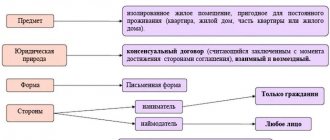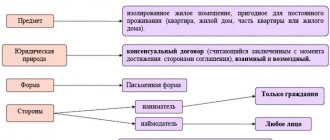Reasons
The main difference between a non-privatized apartment and a privatized one is that the residents using it only have the right to reside. The Constitution of the Russian Federation, the Housing Code of the Russian Federation and other regulations guarantee the right to housing and protect the interests of citizens. However, situations are possible when, according to the law, it is not the tenant who is right, but the owner of the residential premises.
In this regard , social housing rental may be terminated and the concluded contract may be terminated :
- If the employer left for another place of residence, taking all family members with him (Part 3 of Article 83 of the Housing Code of the Russian Federation). In this case, there is not even a need to officially terminate the contract: according to the law, it will be considered terminated on the day the departure took place, unless other rules were established by some act of federal legislation. We must remember that this only applies to moving with registration under a new place of residence. In case of temporary absence, the citizen’s housing is retained unless there are other grounds for terminating social rent.
- With the consent of both parties to the agreement (Part 2 of the same article). The principle of freedom of contract, established in Russian legislation, allows a citizen and the local administration or government body of the Russian Federation or region to conclude an agreement at any time that the tenant refuses the apartment. There may be restrictions by law here. For example, if among the tenant's family members there are minors living in this apartment, the tenant will have to provide evidence that the children will have other housing. Otherwise, objections from local guardianship authorities are possible, and then the contract will not be terminated.
- By decision of the landlord through the court. This option is permissible only in cases expressly provided for in Part 4 of the same article of the code.
- When the physical use of an apartment is terminated due to its complete destruction or due to the death of a single tenant.
The employer's right to terminate the social tenancy agreement
At any time, the citizen-tenant of the dwelling is free to stop using the premises. Subject to the actual termination of use of the housing, the social tenancy agreement is subject to termination.
An important condition for the annulment of the legal relationship of the parties to the contract is the consent of the tenant’s family to terminate the contractual relationship.
Moreover, consent received orally from family members is not enough; it is necessary to obtain from them written evidence of their consent, drawn up in the prescribed manner.
It should be remembered that in accordance with the Housing Code of the Russian Federation, namely Article 71, temporarily absent persons also have rights and obligations in relation to social tenancy premises; accordingly, for the legal and lawful termination of a social tenancy agreement, it is necessary to obtain the consent of temporarily absent citizens who are representatives of the family employer.
Conditions and features
If the contract is terminated by agreement or due to the tenant and his family moving to another premises, everything is simple: here the law does not impose any additional conditions. Art. 27 of the Constitution directly states that a citizen or other person legally residing in Russia has the right to independently choose where to live.
It is more difficult with the situation when the local administration wants to terminate the contract. Part 4 art. 83 of the RF Housing Code indicates that for this she has the following grounds:
- There is a delay in payment for an apartment or utilities, and the debt itself accumulates over the course of six months.
- The tenant or someone living with him damages the housing or tries to destroy it.
- Residents systematically prevent neighbors from using their housing normally. Systematicity means that the violation occurred at least 2 times, and interference can be expressed in flooding of the apartment below, noise at night, etc.
- The apartment is not used for its intended purpose. For example, if a person who has received a municipal apartment uses it as a warehouse, retail outlet or workshop, the local administration will have grounds to terminate the contract with him and evict him from there.
Finally, situations are possible when the contract will be terminated without the fault of the citizen on the initiative of the local administration. They are provided for in Art. 85 of the RF Housing Code and relate to the following cases:
- The house is being demolished.
- The apartment is transferred to the category of non-residential real estate.
- The premises became unsuitable for living in.
- Due to the overhaul, the area of the apartment will change and either the residents will find themselves in need of improved conditions, or, on the contrary, each of them will significantly exceed the established living space standard.
- Housing is given to a religious organization in the manner prescribed by law.
IMPORTANT: In all these cases, the social tenancy agreement is terminated only for those apartments where citizens lived before. In return, the administration is obliged to provide them with similar comfortable housing and conclude a new contract.
When hiring is terminated at the initiative of local authorities, administration employees authorized to do so by regional and local legislation act on its behalf.
When is the procedure unacceptable?
Termination of the agreement is not permitted if the property interests of third parties are violated, incl. minor children. If a dysfunctional family is evicted from housing, then the procedure for depriving parental rights is first carried out. Children are transferred to a specialized children's institution for training and education. But they retain the right to receive housing upon reaching adulthood.
It is impossible to leave without housing incompetent people who do not live at the place of registration for good reasons and citizens serving a sentence in prison.
Termination of a social tenancy agreement makes it possible to resolve problems that have arisen with residents before filing documents in court, to implement a differentiated approach to vulnerable segments of the population, and to preserve the rights of children to receive housing.
If you find an error, please select a piece of text and press Ctrl+Enter.
How exactly is it terminated?
In peaceful way
At the initiative of the employer
If the termination is due to relocation, no special action is required. The tenant is simply deregistered in one place and registered within the period established by law in another.
It will be somewhat more difficult if a citizen wants to enter into an agreement to terminate the contract. Here he will need:
- Submit an application for termination to the housing department of the local administration or the MFC.
- Wait for an answer.
- Come and sign an agreement that terminates the contract.
This is why citizens rarely take this route: why sign unnecessary documents if you can just move out of the apartment?
Landlord
When residents in an apartment commit the violations listed above, the municipal government has the right to try to resolve the matter amicably or invite them to move out on an amicable basis. In this case, a warning is first sent to them. In this document, the landlord requires:
- Stop misuse of the premises (in this case, administrative liability is possible in the manner prescribed by the Code of Administrative Offenses of the Russian Federation).
- Pay off the debt within a reasonable time.
- Stop other violations and eliminate their consequences.
In the event that negotiations and correspondence have no results, the local administration can proceed to judicial action. In turn, if a citizen does not agree with the decision of the local administration (for example, he is not satisfied with the premises provided to replace one that has fallen into disrepair or is located in a house given to a religious organization), he has the right to go to court to protect his rights.
Special cases
In some situations, it is impossible to legally deprive a person of public housing, even if there are reasons listed earlier. The law specifies the categories of citizens whom the municipality has the right to evict only with the provision of other housing if the existing one is declared unsuitable.
Who cannot lose their right of residence?
The following are in a special legal position:
- WWII veterans.
- Minor children who do not have other housing.
- Family members of a deceased employee of some government agencies. Including military personnel, police officers, customs officers, the FSB, the prosecutor's office, the penal system, and the fire service.
- Pensioners.
- Family members of a deceased professional who was provided with housing in connection with his activities.
- Disabled people of groups 1 and 2, if their health condition has deteriorated as a result of professional activity.
Where should the loser go?
If the case was lost in the district court, the party dissatisfied with the decision may appeal:
- To the appellate instance (in accordance with Chapter 39 of the Code of Civil Procedure of the Russian Federation) - on decisions that have not yet entered into force. The deadline for submission is 1 month.
- To the cassation instance (in accordance with Chapter 41 of the Code of Civil Procedure of the Russian Federation) - if the decision has already entered into force. Duration: six months.
ATTENTION: There is a fee to pay when filing both complaints. Its amount is half of what was paid in the court of first instance.
Differences between types of lease agreements
In addition to social, the legislation also provides for “commercial” rental of residential premises (Chapter 35 of the Civil Code of the Russian Federation). In this case, the lessor is not the municipality or the state, but a private person or commercial organization.
Such an agreement can also be terminated by agreement of the parties, at the request of the employer, or in court. The grounds for termination through the court will be the same as for social rent, but with one exception: if the contract is concluded for a period of less than a year (even with a subsequent extension), the tenant can be evicted if he has not paid the rent twice in a row (para. 2 clause 2 of article 687 of the Civil Code of the Russian Federation).
Changes and termination of the social tenancy agreement for residential premises are made in accordance with the requirements of Art. 82 and 83 of the RF Housing Code and taking into account the general rules on amendment and termination of civil contracts established in Art. 450-453 Civil Code of the Russian Federation.
It should be noted that termination of a housing tenancy agreement leads to its early termination. The current housing legislation has a special article 82 of the Housing Code of the Russian Federation with the title “Changing the social tenancy agreement for residential premises.” According to it, the social tenancy agreement for residential premises is changed in two cases:
1) at the request of employers united into one family, and not merging;
2) at the request of a legally capable family member to change the employer.
There are two procedures for changing and terminating a contract: extrajudicial and judicial.
Extrajudicial procedure is used to amend and terminate a contract by agreement of the parties. As general rules defining the procedure for reaching an agreement between the parties, the rules of Chapter. 28 of the Civil Code of the Russian Federation on the conclusion of an agreement, i.e. one party approaches the other with a corresponding proposal and can give consent (acceptance) to conclude a contract. The amendment and termination of the contract must be made in the same form as the concluded contract.
According to Part 1 of Art. 81 of the Housing Code of the Russian Federation, a change in the contract occurs at the request of one of the parties to the contract - employers and members of their families - out of court, which is a deviation from the general rules of civil legislation (Articles 450-453 of the Civil Code of the Russian Federation).
Regarding Part 2 of Art. 82 of the Housing Code of the Russian Federation, it should be noted that a legally capable (and not an adult) family member can demand recognition of himself as a tenant with the consent of the remaining family members and the landlord.
At the same time, the legislator did not determine the grounds for refusal on the part of the lessor and did not oblige the latter to motivate the decision. However, the landlord's refusal can be appealed in court.
When an agreement is subject to amendment or termination in court, it is necessary to take into account that a claim can be filed by a party in court only after receiving a refusal from the other party to the proposal to amend or terminate the agreement or failure to receive a response to this proposal in a timely manner, and in its absence - within 30 days. day period (clause 2 of article 452 of the Civil Code). In court, a contract can be modified or terminated through a civil rights claim.
According to paragraph 2 of Art. 450 of the Civil Code of the Russian Federation, a contract can be changed at the request of one of the parties by a court decision only if there are significant changes in the circumstances from which the parties proceeded when concluding the contract. Thus, the ruling of the Presidium of the Samara Regional Court states that “a change in circumstances is considered significant when they have changed so much that, if the parties could have reasonably foreseen this, the contract would not have been concluded at all[1].
Significant changes in housing tenancy are evidenced by cases when the premises are no longer suitable for permanent residence, are in disrepair, etc.
If the contract is amended, the obligations of the parties remain unchanged.
Previously, the RSFSR Housing Code provided for the possibility of changing the rental agreement for residential premises at the request of a family member of the tenant.
The new code does not provide for the allocation or division of residential premises occupied by citizens under a social tenancy agreement at all. Thus, the changes provided for by the Housing Code of the Russian Federation limit the housing rights of citizens in comparison with previously existing legislation.
The Constitutional Court of the Russian Federation dated June 20, 2006 No. 225-0 indicated that, in contrast to the previously effective legislation (Article 86 of the RSFSR Housing Code), the Housing Code of the Russian Federation, namely its Art. 82 does not provide for the right of an adult family member of the tenant to demand the conclusion of a separate rental agreement for residential premises with him. Responding to the complaint of citizen S.V. Garanina for infringement of her rights and the fact that Art. 82 of the RF Housing Code contradicts Part 2 of Art. 56 of the Constitution of the Russian Federation, according to which laws should not be issued that abolish or diminish the rights and freedoms of man and citizen, the Constitutional Court o.[2] Thus, the Constitutional Court avoided giving a reasoned answer to the applicant on the merits.
R.D. Zorkoltsev believes that S.V. Garanina “should have filed a claim for the division of residential premises and the conclusion of a separate rental agreement for residential premises.” It would be possible to carry out division in this case, which would exclude an appeal to the Constitutional Court[3].
At the same time, G. Harutunyan, referring to the Introductory Law to housing relations that arose before its entry into force, comes to the conclusion that the Housing Code applies only to those rights and obligations that arise after its entry into force. Based on this, he believes that:
1) a former family member of the employer has the same rights as the employer, including the right to demand the conclusion of a social tenancy agreement with him in the manner and on the conditions provided for in Chapter 8 Housing Codes of the Russian Federation;
2) the former member of the tenant’s family is independently responsible for his obligations arising from the corresponding (separate) social rental agreement (Part 4 of Article 69 of the Housing Code of the Russian Federation);
3) The Housing Code does not exclude the possibility of the existence of a separate rental agreement in a separate apartment (Article 82 of the Housing Code); The residential complex does not contain any prohibitions on changing rental agreements and concluding a rental agreement in one apartment[4].
Obligations are considered changed from the moment the parties agree to amend the contract, and when amending the contract in court - from the moment the court decision to amend the contract enters into legal force.
A social tenancy agreement can be terminated at any time by agreement of the parties.
It should be borne in mind that according to paragraph 15 of Art. 15 of the Federal Law of May 27, 1998 “On the Status of Military Personnel” provides that in the event of vacancy of residential premises occupied by military personnel and members of their families living with them, with the exception of residential premises owned by them, these premises are provided to other military personnel and members of their families. It should be taken into account that the Federal Law of August 22, 2004 No. 122-FZ “On amendments to the legislative experiences of the Russian Federation and the recognition of certain legislative acts of the Russian Federation as invalid” did not change the provisions of the Federal Law “On the Status of Military Personnel” that establish the right for re-occupancy.
A social tenancy agreement for residential premises may be terminated by the tenant at any time with the written consent of his family members living with the tenant. According to V.D. Ruzanova, termination of a residential tenancy agreement is an act of will, which by its legal nature is a unilateral or bilateral transaction[5].
Termination of a contract means the end of the legal connection that existed between its participants, either as a result of its rupture, or as a result of an event independent of the will of the participants, or by agreement between them or by the will of one of them.
The traditional theoretical approach to the relationship between the concepts of “termination of a contract” and “termination of a contract” is that termination is a generic concept that includes termination.
ABOUT. Novikova writes that “in Art. 83 of the RF Housing Code, this traditional approach to the relationship between the concepts of “termination of a contract” and “termination of a contract” is violated. The grounds for termination of a social tenancy agreement are disclosed in parts 1-4 of Art. 83 of the Housing Code of the Russian Federation. Then, in part 5 of Art. 86 of the Housing Code of the Russian Federation provides that a rental agreement for residential premises is terminated due to the loss (destruction) of residential premises, or with the death of a tenant living alone. Thus, termination of the contract is not included in the cases of its termination”[6].
To comply with traditional legal views and eliminate existing contradictions, she proposes to “amend Article 83 of the RF Housing Code.
In part one, disclose cases of termination of a social tenancy agreement:
1) termination of the contract;
2) loss (destruction) of residential premises;
3) death of a tenant living alone.
Then, in part 2 of Art. 83 of the Housing Code of the Russian Federation, disclose the grounds for termination of the contract”[7].
It is noteworthy that in Part 3 of Art. 83 of the Housing Code states that “in the event of the departure of the tenant and his family members to another place of residence, the social rental agreement for residential premises is considered terminated from the date of departure.”
In this regard, the opinion of S.D. is of interest. Radchenko, who believes that:
1. Departure must be associated specifically with a change of place of residence - this is not a departure for study or on a business trip. At the same time, the testimony of the witness that he has not seen this person for a long time cannot be taken into account without clarifying the reasons for the absence of the person who left and his desire to retain the right to housing.
2. evidence of the absence of this circumstance is recognized as: maintaining registration, making utility payments, service in a clinic at the place of residence, taking measures to exchange residential premises;
3. voluntariness of departure, which can be proven by witness testimony, written statements to the police department[8]. In the legislation, various terms are used to denote actions aimed at the withdrawal of one of the participants on the employer’s side from legal relations: in Part 3 of Art. 83 of the Housing Code of the Russian Federation is “traveling to another place of residence”, in Art. 686 of the Civil Code of the Russian Federation - “disposal”, which is more consistent with the meaning: to leave, retire, leave a place, be absent. There are no special rules on the regulation of relations arising when some participants on the tenant’s side leave the legal relationship of housing tenancy;
At the same time, it should be recognized that it is appropriate that the departure of individual members of the tenant’s family to another permanent place of residence is the basis for recognizing them as having lost the right to use residential premises provided under a social tenancy agreement.
Having considered the claim for termination of the rental agreement and deregistration of Mr. S., the Federal Court of the Sovetsky District of Samara satisfied it. Canceling this decision, the judicial panel for civil cases of the Samara Regional Court indicated that law enforcement practice is based on the fact that, in accordance with the requirements of Part 4, 71, Art. 69 and art. 83 part 3 of the Housing Code of the Russian Federation, a former member of the tenant’s family can be recognized as having lost the right to reside in residential premises only if he left for permanent residence and voluntarily renounced his rights and obligations under the social tenancy agreement.
The judge’s decision does not contain a judgment as to whether citizen S. left the disputed apartment for another permanent place of residence. The court did not give a proper assessment to the fact that S. left the apartment due to the divorce in 1992, explaining that he was forced to do this in order to avoid scandals. From the plaintiff’s explanations, it is clear that after S. left the apartment, the front door was replaced with a new lock, the keys to which the ex-husband did not have, which also needs to be checked[9].
Often, claims indicate that the defendant has started another family and lives in a different place of residence, which indicates that he has left for another permanent place of residence. Therefore, the decision of the Presidium of the Samara Regional Court deserves attention, which, canceling the court decision, pointed out the need to find out the composition of the new family in which the defendant M. lived since 1997, since according to the legislation in force at that time (Articles 53-54 of the Housing Code of the RSFSR ) the right to living space was given to citizens moved in by the tenant with the written consent of all adult members of his family, if these citizens were or were recognized as members of the tenant’s family and if upon moving in there was no other agreement on the procedure for using another residential premises. Therefore, in order to properly resolve the dispute, it was necessary to establish whether M. is a member of the family of the tenant of the apartment indicated by the plaintiff[10].
In Part 4 of Art. 83 of the Housing Code of the Russian Federation provides for termination of a social tenancy agreement for residential premises at the request of the landlord only in court in the event of:
a) failure by the tenant to pay for housing and (or) utilities for more than six months. This paragraph duplicates the content of Art. 155 Fundamentals, which, in addition to eviction, provided for the amount of penalties;
b) destruction or damage to residential premises by the tenant or other citizens for whose actions he is responsible (for example, subtenants, temporary residents);
c) systematic violation of the rights and legitimate interests of neighbors, which makes it impossible to live together in the same residential premises;
d) use of residential premises for other purposes. “In this regard, it is not clear what kind of misuse of housing we are talking about, if currently residential premises can be used not only for the residence of citizens, but also for carrying out professional or individual entrepreneurial activities,” A.A. is perplexed. Titov[11].
In paragraph 5 of Art. 83 of the Housing Code of the Russian Federation states that a social tenancy agreement for residential premises is terminated due to the loss (destruction) of the latter. In general, you can lose the right to use residential premises, but it is hardly possible to lose residential premises.
In addition, the use of two different concepts – “destruction” and “loss of housing” – as synonyms can hardly be considered a successful finding by the legislator. If we are talking about the physical destruction of an object, then this must be clearly reflected in the law.
The list specified in Art. 83 of the Housing Code of the Russian Federation, is formulated as exhaustive.
The Housing Code of the Russian Federation does not regulate the issue of loss of the right to use residential premises. It is unlikely that it would be correct to terminate the social tenancy agreement provided for in Art. 83 of the Housing Code of the Russian Federation, and to evict all users of housing without providing residential premises (Article 91 of the Housing Code of the Russian Federation), if one of the total number of users is guilty of damaging the premises or violating the interests of neighbors. We are talking about recognizing in court the guilty person as having lost the right to use the residential premises and evicting him while preserving the validity of the contract for all users of the residential premises. Moreover, Art. 91 of the Housing Code of the Russian Federation provides for the eviction of persons deprived of parental rights without determining the grounds for termination of housing legal relations. This case should be regarded as a loss of the right to use housing.
Due to the fact that the order has ceased to serve as the basis for moving into a residential premises represented in the housing stock for social use, the existing judicial practice on declaring the order invalid and eviction of persons who moved into a specific residential premises according to it is not subject to application under the Housing Code of the Russian Federation. The Housing Code of the Russian Federation does not provide grounds for termination of a social tenancy agreement in case of violation of the priority order for the provision of residential premises from the social use fund.
Consequently, citizens who are registered as needing improved housing conditions and who believe that residential premises should be provided to them cannot go to court with such claims, since they do not have a subjective civil right to the residential premises specified in the rental agreement. The Housing Code does not establish the circle of persons who can bring a claim in such cases.
The eviction of citizens to whom housing was provided on the basis of a social tenancy agreement is carried out according to the rules of Art. 84-85 Housing Code. Eviction from these residential premises is permitted only through judicial procedure. The Housing Code of the RSFSR provided for two types of eviction: with the provision of other living quarters and without the provision. The new Housing Code of the Russian Federation clarifies: eviction can be carried out with the provision of another residential premises or without the provision of housing. In cases where a decision is made to provide citizens with other comfortable premises, the court is obliged to check whether the provided premises meet the level of improvement in relation to the conditions of a given locality; At the same time, the livability is taken into account only in houses of the state and municipal housing stock. The premises provided must be located within the boundaries of this locality in a permanent building.
The question arises: is it possible to say that the destruction of a residential premises also gives the tenant the right to claim the application of Art. 85 of the Housing Code of the Russian Federation and, accordingly, demand the provision of other housing? The interpretation of the Housing Code of the Russian Federation gives a negative answer.
If the tenant occupied a separate apartment, he must be provided with a separate apartment. Critics of the Housing Code of the Russian Federation say: if “equivalent living space” is provided, then a family of four will never be able to move out of a one-room apartment, because will receive the area of this particular apartment. Yesterday they did not have to pay extra for additional meters, they simply received three rooms from the city according to the social norm. Now they can be forced to pay extra? P.V. Krasheninnikov replies: “Yes, there is still some kind of contradiction here. When I said that when relocating a house undergoing demolition, the previous norms apply, I meant Art. 86 LCD “Procedure for the provision of residential premises under a social tenancy agreement in connection with the demolition of a house.” This article states that citizens evicted from a house subject to demolition “are provided with other comfortable living quarters under social tenancy agreements. In this case, naturally, social norms for the provision of living space adopted in a particular city or village must apply.” The same procedure is provided for in Art. 87-88 for cases when the house is declared unfit for habitation or is undergoing major repairs. But Art. 89, indeed, contradicts the previous three. It should, of course, indicate: “based on the number of family members” [12].
Housing Code of the Russian Federation in Art. 85 provided for the provision of comfortable residential premises in the event that:
1) the house in which the living space is located is subject to demolition. According to clause 7 of the Regulations on recognizing a premises as a residential premises, a residential premises as unfit for habitation and an apartment building as unsafe and subject to demolition, suitable (unsuitable) for citizens to live in, as well as an apartment building as unfit for habitation and subject to demolition, recognition is carried out by an interdepartmental commission. The owner of the residential premises or a person authorized by him is invited to work in the commission with the right to vote;
2) residential premises are subject to transfer to non-residential premises;
3) the residential premises are declared unfit for habitation. The Decree of the Government of the Russian Federation of January 28, 2006 No. 47 “On approval of the Regulations on the recognition of premises as residential premises, residential premises unfit for habitation and an apartment building as unsafe and subject to demolition” [13] stipulates that the grounds for recognizing residential premises as unfit for habitation should be consider their location in dangerous zones of landslides, mudflows, snow avalanches, as well as in areas that are annually inundated by flood waters. Premises located in apartment buildings that have been damaged as a result of explosions, accidents, fires, earthquakes, or uneven soil subsidence will be unsuitable for habitation if restoration work is technically impossible or economically infeasible. In these cases, these apartment buildings are recognized as unsafe and subject to demolition. At the same time, paragraph 2 of Art. 57 of the RF Housing Code provides for the right of citizens whose premises are duly recognized as unfit for habitation and are not subject to repair or reconstruction, to an extraordinary provision of residential premises. We believe that the phrase “cannot be repaired or reconstructed” is redundant, since the housing has been declared unfit for habitation.
S.I. Suslova writes about this: “In relation to a social tenancy agreement, the question arises about the relationship between Art. 57 Housing Code of the Russian Federation with Art. 85 Housing Code of the Russian Federation. It turns out that if a residential premises is recognized as unsuitable on the basis of clause 38 of the Decree of the Government of the Russian Federation No. 47, then the citizen acquires the right to demand the provision of housing in an extraordinary manner. And if the premises are recognized as unsuitable for other reasons (for example, due to the presence of identified harmful factors in a person’s environment that do not allow him to ensure the safety of life and health of citizens), then the application of the rules on priority provision of housing is unacceptable and the citizen has the right to demand his eviction for based on Art. 85 Housing Code of the Russian Federation. Legal uncertainty in this matter should also be eliminated”[14];
4) as a result of major repairs or reconstruction of the house, the residential premises cannot be preserved or its total area will decrease, as a result of which the tenant and his family members living in it may be recognized as needing residential premises, or it will increase, as a result of which the total area of the occupied premises residential premises per family member will significantly exceed the provision norm.
According to Art. 90 of the Housing Code, the eviction of the tenant and members of his family living with him from the residential premises due to failure to pay for the residential premises and utilities for six months without good reason is carried out with the provision of another residential premises under a social tenancy agreement, the size of which corresponds to the size of the residential premises premises established for moving citizens into a dormitory (i.e., at least 6 sq. m per person). This premises may not meet the criteria for livability. In our opinion, in any case, such a premises must meet the criteria of a residential premises - be intended for the residence of citizens, meet established sanitary and technical rules and regulations, as well as other legal requirements and be located within a populated area, since a different interpretation would violate the right of a citizen to choose a place of residence.
The Plenum of the Supreme Court of the Russian Federation, in a review of practice, indicated that “the specific residential premises must be indicated in the statement of claim, otherwise the claim must be left without progress. If such a claim is accepted, then it must be denied.”[15].
Rules on eviction due to failure to pay rent and utilities have received mixed reviews. Thus, in a letter from Rospotrebnadzor dated 02/08/2006 on improving the efficiency of work related to ensuring the protection of consumer rights in the field of housing construction and in the provision of housing and communal services, it is indicated that the provisions of the Housing Code on eviction from residential premises for non-payment of fees do not contribute to protecting the interests of citizens.
The disadvantages of Art. 90 of the RF Housing Code can be attributed to the fact that it does not disclose the concept of “good reasons”. The reason for non-payment does not affect the possibility of termination of the contract. At the same time, according to Art. 83 of the Housing Code, termination of a contract due to non-payment of payments is possible only in the absence of valid reasons from the tenant, which include long delays in the payment of wages and pensions, unemployment, and difficult financial situation within the family. If we talk about eviction due to impossibility of residence, then the literal interpretation of Art. 83 of the Housing Code leads to the conclusion that this applies to neighbors living in the same residential premises, and not in an apartment building, which is not a residential premises. Interested parties who may demand the eviction of the tenant in case of violation of their rights, interests or mismanagement are not only the landlord, but also the tenant’s neighbors, members of his family living with him. However, these interested parties can demand the eviction of the tenant, but not the termination of the contract.
Citizens may be evicted from residential premises provided to them under a social tenancy agreement without the provision of other residential premises in the cases provided for in Art. 91 LCD. This is possible if the tenant and (or) other citizens for whom he is responsible use the residential premises for other purposes, systematically violate the rights and legitimate interests of neighbors, or mishandle the residential premises, allowing them to be destroyed. Citizens for whose actions the employer is responsible under a social tenancy agreement include: members of the employer's family (Part 2 of Article 69 of the RF Housing Code); subtenant and citizens moving in with him (part 3 of article 76 of the Housing Code of the Russian Federation); temporary residents (Part 3 of Article 80 of the Housing Code of the Russian Federation). Unfortunately, housing legislation does not cover the concepts of “destruction” and “damage to residential premises.” These actions in themselves do not constitute grounds for the landlord to go to court with an appropriate demand for eviction. The landlord is first obliged to warn the tenant and his family members living with him about the need to eliminate the violations. If these violations entail the destruction of living quarters or sanitary equipment, then the landlord also has the right (but is not obligated) to assign the tenant and his family members a reasonable period to eliminate these violations. If, after the warning, these persons do not eliminate the violations listed in Art. 91 of the Housing Code, the landlord has the right to go to court with a demand to evict these persons.
“Thus, on the basis of a residential lease agreement, a certain “real encumbrance” arises for the owner of the residential premises (lessor) in the form of a restriction of the real right of use of the tenant and members of his family”[16].
In Art. 91 of the Housing Code provides for the rule that citizens deprived of parental rights may be evicted without the provision of residential premises if the cohabitation of these citizens with children in respect of whom they are deprived of parental rights is recognized by the court as impossible.
[1] Determination of the Presidium of the Samara Regional Court (extract) No. 07-06126 dated March 18, 2004 // Archive of the Samara Regional Court.
[2] SPS “Garant”.
[3] Zorkoltsev, R.D. Decree. op. – P. 171.
[4] Arutunyan, G. Chance for a separate rental agreement / G. Arutunyan // Home lawyer. – 2005. – No. 15. – P. 2-5.
[5] Ruzanova, V.D. Termination of a residential lease agreement / V.D. Ruzanova // Housing law. – 2005. – No. 3. – pp. 14-16.
[6] Novikova, O.B. Decree. op.
[7] Ibid. – P. 72.
[8] Radchenko, S.D. Disputes regarding the recognition of a citizen as having lost the right to use residential premises occupied under a social tenancy agreement / S.D. Radchenko // Housing law. – 2002. – No. 2. – P. 60-67.
[9] Determination of the judicial panel for civil cases of the Samara Regional Court 05-1550 dated April 10, 2006 // Archive of the Samara Regional Court.
[10] Extract from the resolution of the Presidium of the Samara Regional Court No. 0706/73 dated March 1, 2007.
[11] Titov, A.A. Commentary on the new Housing Code of the Russian Federation / A.A. Titov. – M.: Yurayt, 2005. – P. 91.
[12] Nevinnaya, I. Housing for everyone and for everyone? / I. Nevinnaya // Russian newspaper. – 2005. – March 17. – No. 52 (3721).
[13] Collection of legislation of the Russian Federation. – No. 6. – St. 702.
[14] Suslova, S.I. On the issue of the relationship between the concept of suitability and loss (destruction) of residential premises / S.I. Suslova // Housing law. – 2007. – No. 5. – pp. 34-37.
[15] Review of cases on termination of a social tenancy agreement due to the tenant’s failure to pay for housing and utilities within six months // Bulletin of the Supreme Court of the Russian Federation. – 2000. – No. 8. – P. 23.
[16] Konchalova, I.V. Ownership and other property rights of citizens to residential premises: dis. ...cand. legal Sciences / I.V. Konchalov. – M.: Moscow State University Publishing House, 2006. – P. 180.







